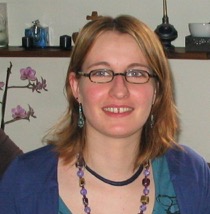Jacques Monod Institute, CNRS, UMR 7592, Paris Diderot University, Sorbonne Paris Cité, 75013 Paris Introns Protect Eukaryotic Genomes from Transcription-Associated Genetic Instability.Mol Cell. 2017 Aug 17;67(4):608-621.e6. doi: 10.1016 Bonnet A, Grosso AR, Elkaoutari A, Coleno E, Presle A, Sridhara SC, Janbon G, Géli V, de Almeida SF, Palancade B.
Cv
Aged 31, Amandine Bonnet studied at ENS Cachan. After a specialization in virology, she realized a thesis in the laboratory of Dr. Claudine PIQUE (Institut Cochin, Paris) on the HTLV (Human T-cell Leukemia Virus) protein. During her thesis, defended in 2012, she studied the molecular mechanisms diverted by Tax to promote the propagation of the virus and able to induce cell transformation. During her post-doctoral studies with Dr Benoit PALANCADE (Institut Jacques Monod, Paris), she wished to better understand the processes regulating the expression and integrity of eukaryotic genomes using Saccharomyces cerevisiae as a model. In particular, she showed that introns prevent accumulation of DNA-RNA or R-loop hybrids, genotoxic structures that threaten the stability of eukaryotic genomes. This work, published in Molecular Cell, revealed that this new function of the introns is conserved during the evolution and confirms that the organization of the genome is optimized to allow both its expression and its stability. Now, Amamdine Bonnet is interested in the consequences of the presence of retrotransposons on the integrity of eukaryotic genomes in the team of Dr. Pascale LESAGE at the University Institute of Hematology (Hôpital Saint-Louis, Paris).
Contact
Team Dynamic of Retroviruse and Retrotransposons
Laboratory Pathology and Molecular Virology
Laboratoire Pathologie et Virologie Moléculaire
CNRS/P7 UMR7212, INSERM U944
16 rue de la Grange aux Belles - F75010 PARIS
Tel: 01 53 72 40 78
Abstract
Transcription is a source of genetic instability that can notably result from the formation of genotoxic DNA:RNA hybrids, or R-loops, between the nascent mRNA and its template. Here we report an unexpected function for introns in counteracting R-loop accumulation in eukaryotic genomes. Deletion of endogenous introns increases R-loop formation, while insertion of an intron into an intronless gene suppresses R-loop accumulation and its deleterious impact on transcription and recombination in yeast. Recruitment of the spliceosome onto the mRNA, but not splicing per se, is shown to be critical to attenuate R-loop formation and transcription-associated genetic instability. Genome-wide analyses in a number of distant species differing in their intron content, including human, further revealed that intron-containing genes and the intron-richest genomes are best protected against R-loop accumulation and subsequent genetic instability. Our results thereby provide a possible rationale for the conservation of introns throughout the eukaryotic lineage.




